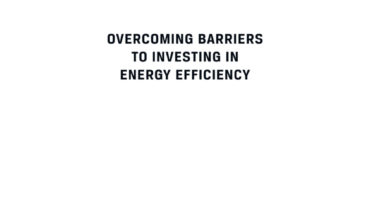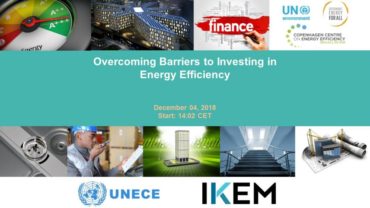Energy efficiency implementation at a global level is an essential dimension of climate action, and is considered fundamental to achieving the goals of the Paris Agreement. An overwhelming majority of the Intended Nationally Determined Contributions to the agreement submitted by countries recognize energy efficiency as a primary delivery strategy.
Improving energy efficiency comes with multiple social, economic, and environmental benefits. Improved health and well-being, cleaner air, improved economic productivity and employment creation are some of the rewards to be gained from a more efficient use of energy.
From analytical studies to capacity building activities and industrial investments, considerable international effort has already gone into promoting energy efficiency. However, the fact remains that much of the potential for energy efficiency improvement remains untapped, and many opportunities for win-win energy efficiency projects are being lost. To effectively mitigate climate change and realize the transition to clean and sustainable development, progress must be made to significantly accelerate energy efficiency action.
In order to address this challenge and effectively support countries and cities to raise their ambition and realize their targets and goals for improving energy efficiency, a new study Overcoming Barriers to Investing in Energy Efficiency looks into challenges and ways to overcome them.
The practitioners’ point of view
A vast body of research exists on the topic of energy efficiency investments and the barriers that prevent the potential of improving energy efficiency from being fully realized. This publication contributes fresh perspectives to the issue by bringing to light the valuable insights on the challenges and solutions for overcoming barriers to energy efficiency investments provided by practitioners working in the field, obtained through a survey of UNECE countries, as well as countries beyond the region.
UNECE Executive Secretary Olga Algayerova and John Christensen, Director of UNEP DTU Partnership, highlighted how the analysis of the survey and its conclusions and recommendations can serve as a useful tool for the energy efficiency community, first of all for the policy makers who can apply the results to the situation in their countries and find approaches to improve the investment climate for energy efficiency. This may include, where appropriate, improving regulatory frameworks, including implementation and enforcement; making financial institutions more aware of energy efficiency financing and reducing perception of its high risk; and raising awareness about the multiple benefits of energy efficiency projects.
This study is the outcome of a collaboration between UNECE and the Copenhagen Centre on Energy Efficiency, part of the UNEP DTU Partnership.


